Category Archive 'Peter Salovey'
13 Nov 2021


The numbers:
4,664 undergraduate students
4,962 faculty
5,042 administrators
——————————————
“I think we don’t yet have a Vice President for the rights of the left-handed, but I haven’t checked this month.” — Professor Leslie Brisman.
——————————————
Oldest College Daily:
Over the last two decades, the number of managerial and professional staff that Yale employs has risen three times faster than the undergraduate student body, according to University financial reports. The group’s 44.7 percent expansion since 2003 has had detrimental effects on faculty, students and tuition, according to eight faculty members.
In 2003, when 5,307 undergraduate students studied on campus, the University employed 3,500 administrators and managers. In 2019, before the COVID-19 pandemic’s effects on student enrollment, only 600 more students were living and studying at Yale, yet the number of administrators had risen by more than 1,500 — a nearly 45 percent hike. In 2018, The Chronicle of Higher Education found that Yale had the highest manager-to-student ratio of any Ivy League university, and the fifth highest in the nation among four-year private colleges.
According to eight members of the Yale faculty, this administration size imposes unnecessary costs, interferes with students’ lives and faculty’s teaching, spreads the burden of leadership and adds excessive regulation. By contrast, administrators noted much of this increase can be attributed to growing numbers of medical staff, and that the University has proportionally increased its faculty size.
“I had remarked to President Salovey on his inauguration that I thought the best thing he could do for Yale would be to abolish one deanship or vice presidency every year of what I hoped would be a long tenure in that position,” professor of English Leslie Brisman wrote in an email to the News. “Instead, it has seemed to me that he has created one upper level administrative position a month.”
RTWT
29 Mar 2021

They pay Peter Salovey $1,662,386 per year to destroy Yale. Amazingly, a fair number of inferior schools pay their presidents even more. The top earner, the President of California’s University of Spoiled Children gets $7,061,188.
Chronicle of Higher Education
23 Oct 2020


Peter Salovey, God help us! President of Yale. My dog would do a better job.
When Yale President Peter Salovey intends to make a grandiose concession to the small minority of radical student demonstrators, he first protects himself from reproach by forming an “expert committee” to develop applicable principles to be applied to the issue in question.
Salovey’s cherry-picked committee, of course, will be composed of ultra-liberal profs specifically ideologically-committed to the intended radical course Salovey intends to pursue.
A few years ago, the goal was renaming Calhoun College. This time, Yale is going to bow to student activist demands to use its investment program to make political statements stigmatizing fossil fuels.
Yesterday, Yale issued the following pretentious claptrap initiating the whole ridiculous sham process.
Yale University has formed an expert committee to guide the university as it evaluates its investment policies in relation to companies producing fossil fuels, President Peter Salovey announced Oct. 22.
The new committee is charged with recommending a set of principles that will inform Yale’s Corporation Committee on Investor Responsibility (CCIR) as it applies the university’s ethical investment policy to fossil fuel companies. The CCIR works in consultation with the Advisory Committee on Investor Responsibility (ACIR).
The new committee, which will collect input from the Yale community, will begin its work immediately and will deliver the report during the Spring 2021 semester.
After a Feb. 20, 2019, Faculty of Arts and Sciences (FAS) Senate meeting on fossil fuels divestment, the FAS Senate proposed that the president appoint a committee to reexamine ethical investing at Yale with respect to companies that extract or produce fossil fuels.
In Salovey’s charge to the Committee on Fossil Fuel Investment Principles (CFFIP), he noted that the changes necessary to avert an irreversible climate catastrophe “cannot be implemented overnight, and depend not only on scientific advancement but also [on] significant political, economic, and personal contributions.â€
“Nonetheless,†he continued, “climate change poses an existential threat to life on our planet, and we have a responsibility to examine whether our investment policies are appropriate or need to be modified with respect to this challenge.â€
In 2014, Yale, acting in its role as an institutional investor, asked its external investment managers to incorporate the full cost of carbon emissions in investment decisions. At the time, managers were told to avoid investing in companies that disregard the social and financial costs of climate change and that fail to take economically reasonable steps to reduce greenhouse gas emissions.
“Without diminishing the significance of these [past] efforts, I am fully aware that the alarm bells are growing louder, as scientific projections worsen, natural disasters intensify, and governments are slow to develop and implement effective policies,†Salovey wrote in the committee charge.
Salovey said the new committee will produce a “concrete framework†for applying to fossil fuel producers the guidelines set forth in “The Ethical Investor,†Yale professor John Simon’s highly influential 1972 book. That book established general criteria for universities to consider factors beyond economic return when making investment decisions and exercising rights as a shareholder.
The committee will identify the activities, behaviors, and/or characteristics of fossil fuel producers that would constitute “social injury†of such grave character that divestment could be warranted.
“The formation of this committee demonstrates significant concern at the highest level of the university about climate change and a commitment to act proactively,†said CFFIP chair Jonathan R. Macey, the Sam Harris Professor of Corporate Law, Corporate Finance and Securities Law at Yale Law School. “Our principles for making decisions related to divestment should reflect changing circumstances and the lack of decisive action by entities such as governments that we might normally rely upon for coordinating the nation’s response to existential threats like global warming.â€
The committee will include experts drawn from the Yale faculty, and may also consult with other experts in relevant fields. Its members, in addition to Macey, are Ruth Blake, professor of Earth & Planetary Sciences, Department of Earth & Planetary Sciences; Benjamin Polak, William C. Brainard Professor of Economics, School of Management, Department of Economics; Mary-Louise Timmermans, professor and director of undergraduate studies, Department of Earth & Planetary Sciences; Xinchen Wang ’09, director, Yale Investments Office.
The committee additionally will seek input from the wider Yale community.
RTWT
Talk about the culture rotting from the top down.
19 Sep 2019

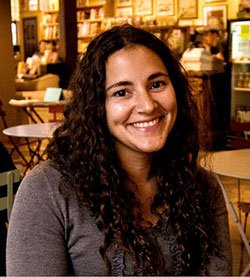
Laurie Santos, new “Head” of Silliman College, famed for teaching an extremely popular course on Happiness.
The Yale Daily News reports that a Yale junior’s Instagram quip has the campus again in a turmoil over Free Speech, with many students demanding punishment, Silliman Head Laurie Santos promising action and then crawfishing, Peter Salovey timidly defending Free Speech, and faculty arguing.
All this ICE but no detention centers in sight,†read the caption, beneath an Instagram photo of a Yale junior smiling amid a backdrop of snowy mountains.
Was the gaffe a distasteful joke or an affront to undocumented immigrants? Yale administrators and faculty disagreed. Screenshots of the post — a play on the U.S. Immigration and Customs Enforcement agency and ice itself — quickly went viral on social media. Students denounced the junior for joking about the plight of undocumented immigrants, who sometimes spend weeks and months in border detention facilities. Tweets criticizing the post received thousands of likes and more than 900 retweets. One student said he is “glad to see that Yale is still prepping for the future generations of Kavanaughs.†Others urged their peers to email the head of the junior’s residential college, psychology professor Laurie Santos and demanded consequences for the junior. …
As emails requesting the student to be held accountable for his Instagram post inundated Santos’ inbox, the Silliman Head of College responded to at least one student’s call for action against the junior.
“I have now heard about this incident from many, many students,†Santos wrote in the email, which was obtained by the News. “I’m upset that a member of my community would post something like this and I will take action on it. I will be bringing this up with the proper channels.â€
While some students said they appreciated Santos’ note, many members of the University community voiced concerns about the email’s implications on whether administrators and faculty members have the jurisdiction to regulate students’ speech.
English professor David Bromwich said the idea that the junior “should somehow be punished, or cited to justify a reprimand, seems a clear overreach of authority.â€
“[Of] course the result [of Santos’ email] would be to chill speech generally,†Bromwich said. “People say silly things like this all the time, on campus and in everyday life elsewhere. Will you install microphones in the potted plants and try to catch them all?â€
In an interview with the News, Chairman of the Institute for Free Speech Bradley Smith said Santos’ email is “absurd and anti-liberal.†The email sends a message that students now have to be extra careful to not upset others and “gives a license to social justice warriors to pick on students they don’t like,†Smith said. He added that free speech is not only about a lack of censorship, but also about an open attitude of accepting controversial ideas.
In an email to the News on Wednesday, Santos said in hindsight, she “would have worded things differently to make it clearer that what I wanted to do was gather more information — that was the action I had in mind.†…
Salovey did not comment on whether he had spoken with Santos about her handling of the matter.
“I would like to take this opportunity to underscore that Yale is committed firmly to free expression,†Salovey said. “To learn, to create knowledge, to teach and to improve the world, we must engage in the exchange of ideas freely, especially when we disagree with one another. I have always encouraged members of the Yale community to participate in open discussions because the answer to speech that offends us is, most often, our own speech.†…
Thomas Kadri GRD ’23 — who is a fellow at the Yale Information Society Project — added that while people should have the right to speak freely, free speech does not mean that people cannot criticize others if they dislike what is said.
“That said, it might also be worrying if many students ‘fear’ the ‘consequences’ of expressing their ideas and opinions,†Kadri added. “Quite how worrying it is would depend on a few things, I think. Are their fears reasonable? What do they actually fear will happen — criticism, social ostracism, bad grades on assignments, worse job prospects?â€
American Studies professor Matt Jacobson said that while the University may have some work to do, feeling uncomfortable is “emphatically not a ‘free speech’ issue of the constitutional sort.†Self-censorship is different from government censorship, and is in some cases “an organic response to the contending interests and the internalized dissonance brought about by social change and societal polarization,†Jacobson said.
He added that even if the climate issues on campus are very real and need to be addressed, it is important to recognize that there is a concerted effort on the right to use free speech as an instrument to advance a particular agenda, such as framing discrimination of ethnic, religious and racial minorities as freedom of expression.
RTWT
06 Mar 2019

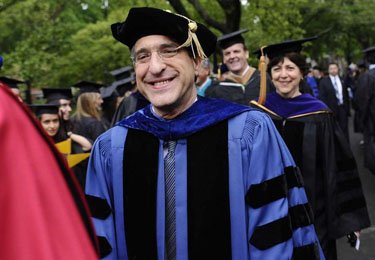
Peter Salovey
Michael Rubin (DP ’94) provides a nearly complete list of Peter Salovey’s atrocities as President of Yale and reports that the chickens are finally coming home to roost: big donors are declining to support the Salovey regime.
He threw respect for free speech and decorum under the bus when he compelled the resignation of Silliman College master Nicholas Christakis in the face of the “shrieking girl†controversy. He legitimized violence when he rehired a dishwasher who smashed a historic stained glass window. In general, he catered to the loudest on campus, always willing to grease the squeaky wheel regardless of the consequence.
When students complained that the term “freshmen” disrespected women and “master” made African-Americans uncomfortable, he simply ordered their change, never mind that it was he who was racializing a term that had ancient collegiate roots. That Yale continues to issue master’s degrees only highlights the lack of intellectual consistency.
Then, when decades-long student protests persisted with regard to a residential college named after 19th century statesmen and Vice President John Calhoun due to the support Calhoun professed during his lifetime for slavery, Salovey first said he would keep the name out of respect for history but, when criticized by student activists, convened a handpicked and Orwellian “ Committee to Establish Principles on Renaming†which recommended changing the name of the college. The problem with such a move was not simply the willingness to erase history at one of the nation’s most elite universities, but also intellectual inconsistency: Calhoun may have provided intellectual sustenance to the pro-slavery south, a not uncommon position at the time, but Elihu Yale, after whom the entire university is named, actually traded slaves during his lifetime.
Salovey’s hostility toward history has extended further to university tradition. Yale long prided itself on being centered on its undergraduates. Admissions officers sang the merits of residential colleges, each a unique community within the broader university. But, Salovey, who did not attend Yale as an undergraduate, homogenized the colleges in order to eliminate any differences between them. While the freshmen class dined together in “University Commons†since 1901, he closed the iconic dining hall in order to build a student center whose need (or need in that location) most students (let alone alumni) continue to question. Most recently, Salovey has put the open stacks of Yale’s underground library on the chopping block.
Now, it seems that the university is paying the price for Salovey’s general gutlessness. Yale has, for years, been seeking to undertake a major capital campaign. Often, universities announce their campaigns after a silent stage in which they get high-profile donors to commit to the effort. According to staffers within Yale’s fundraising arm, the university was forced to delay its campaign for several years because big donors are rightly worried about Yale’s direction and its tendency to prioritize politics above academics.
Yale’s embrace of identity politics reinvigorates self-segregation and pits groups against each other. An ever-expanding array of ethnic deans spoon feeds ideology to students rather than make them organize for themselves. Yale administrators, largely for political reasons, increasingly seek to weigh in on the private lives of students off campus. Donations are declining as faculty and student antics increasingly hit national headlines or the courts. Giving in the first quarter of the last fiscal year, for example, is lower than in the period for the four previous years.
Yale is also falling behind in fundraising among its peer group of universities as alumni decide not to give. Older alum largely disagree with the direction of the university as it subordinates academe to social action, while the younger alumni whom Salovey sought to appease do not understand why they should donate to a university with a nearly $30 billion endowment. Rather than question fundamentally why the money is no longer rolling in, the university’s response is simply to cease reporting donation statistics.
While Yale cultivates a reputation as an educational and intellectual center, its emphasis under Salovey has been more about politics and social justice. The university trumpets ethnic, religious, and sexual orientation diversity, but shuns intellectual diversity which arguably should trump every other kind.
Perhaps the decline in donations is a sign that Yale’s, and, by extension, other elite universities’, ability to coast on reputation while treating its core education mission with disdain has come to an end. Perhaps it is time for Salovey to resign.
RTWT
Michael Rubin was himself too-PC to include in Salovey’s list of crimes the naming of one of the two new residential colleges for a black lesbian communist whom nobody outside the Radical Left had ever heard of.
Salovey’s concession to Charles Johnson ’54 of Franklin Resources, who ponied up the $250 million to build two new residential colleges in naming one of the new colleges after Benjamin Frankin, a particular hero of Johnson’s unfortunately lacking any meaningful connection to Yale, was regrettable, but comprehensible. He who pays the piper calls the tune and all that. But a lot of us would rather have seen New Residential College 2 named for “Benjamin Franklin’s Dog” instead of for an obscure agitator with only the tenuous connection of a post-Law doctoral degree acquired at Yale Law at the age of 55. Only Peter Salovey would overlook the opportunity to name one of two new colleges located at the foot of Science Hill for Josiah Willard Gibbs.
15 Nov 2018


According to the Yale Daily News, mocking African-American group poses is “racially provocative.”
The Oldest (and seriously competing for Left-est) College Daily was outraged.
The Yale Police Department is investigating reports from Yale students who witnessed two masked people post racially provocative flyers on bulletin boards around Cross Campus on Tuesday night. …
Yale students took photos of the posters, removed them from the bulletin board, replaced them with messages of support for people of color and reported the incident to Yale student life staff and the YPD on Tuesday night. The flyers depicted the symbol of a “White Students’ Union of Yale†and quoted slavery advocate and class of 1804 graduate John Calhoun — the former namesake of what is now Grace Hopper College. The quote reads, “In looking back, I see nothing to regret, and little to correct.â€
YPD officers are currently reviewing camera footage to identify the perpetrators, Goff-Crews told the News. … The department has also stepped up its patrols in “sensitive areas on campus,†including the center of Yale’s campus, where the incident occured [sic].
“I find the sentiments signified by these flyers deeply troubling, and I want to be clear: hate is not welcome on our campus,†Salovey wrote in a campuswide email. “As I have said in the past, the answer to speech one finds repugnant is more speech. [Flyers aren’t speech? Quotations from Calhoun aren’t speech? – JDZ] I have no doubt that the members of the Yale community will respond to expressions of hate, racism, and exclusion on this campus with even stronger affirmations of our values—and a renewed commitment to creating a diverse, inclusive community where all people are welcomed.â€
In the email, Salovey confirmed that the perpetrators violated a University policy which only permits registered student organizations to post flyers on campus [Oh, my! that is an expulsion-worthy offense for sure. –JDZ].
Yale has notified the Southern Poverty Law Center — which monitors hate groups in the U.S. — and the Anti-Defamation League — a Jewish group that fights anti-Semitism and bigotry — about the incident, according to Salovey’s email. …
On Tuesday night, a student posted a photograph of the flyer on the popular Facebook group “Overheard at Yale,†prompting heavy backlash against the perpetrators among commenters.
Students and alumni interviewed by the News condemned the flyers. Prior to Salovey’s email, at least two individuals told the News that they contacted Salovey’s office calling for the University to respond to the incident.
On Wednesday morning, Gene Lyman ’92 also emailed Salovey’s office calling on the University to investigate the situation thoroughly, discipline any current students involved and “reassert Yale’s values as an inclusive and intellectually honest community.â€
“Even if this should prove a hoax, or someone’s sick idea of a joke, I cannot emphasize enough how unacceptable the sentiment expressed in these flyers is,†Lyman wrote in the email to Salovey.
Lyman said he received a response from Joy McGrath, Salovey’s chief of staff, as well as Salovey’s email to the Yale community.
Sohum Pal ’20 sent an email about the incident to Salovey, Goff-Crews and Dean of Yale College Marvin Chun on Tuesday night. In his email, Pal called for the establishment of a Title VI office, which would enforce the federal law that prohibits discrimination based on race, ethnicity, color and national origin at educational institutions, and for a systematic change in University responses to grievances around racial discrimination. Pal said that the University should create a “mechanism for change†instead of releasing emails to “reaffirm its commitments.â€
“Tonight, people put up these fliers around campus,†Pal wrote in his email. “I felt vulnerable — is it any surprise? My time at Yale has been many things — sometimes empowering, but more often I’ve been struck at how expendable students, faculty, and staff of color must be to the university.†Unlike Lyman, Pal said he received no direct response to his email.
Ashtan Towles ’19, a former peer liaison for the Afro-American Cultural Center, told the News that while the perpetrators remain unknown, the act was “done in cowardice,†comparing the masked individuals to Klu Klux Klan members who don masks to protect their identities.
“This incident is merely one of thousands through which white nationalists have attempted to stoke fear in Black communities, but I am always in awe of the resilience and pride that exists in the Black community at Yale,†Towles said in an email to the News.
According to Simon Ghebreyesus ’21, the sentiments of white pride in the flyers are a “sinister presence†for students of color to grapple with at Yale and across the country.
Epongue Ekille ’21 told the News that she had generally viewed Yale as a racially inclusive place but the flyer incident “negates it all.â€
“It was both surprising and not at the same time. Although Yale is proud of its diversity, the matter of the fact is that the student population is majority white and wealthy,†Ekille said. “I’m not surprised that people who have these opinions exist at Yale, I’m just surprised that they would publicly advertise it.â€
RTWT
Evidently, the answer to speech satirizing the rhetoric and poses of African-American Identity Group activists is not actually “more speech.” The answer is to publish hysterical news stories, to refer to the “repugnant speech” as “discrimination,” and “exclusion,” and “hate,” to suggest that it constitutes a possible violation of federal anti-discrimination law, and to treat it as a proper basis for investigation, notification of national left-wing speech and thought supervisory groups, and disciplinary sanctions.
How terribly cowardly it was of those right-wing students to conceal their identities!
13 Dec 2017
If you were a member of the Yale community, you received this Christmas card (carefully designed to avoid so much as mentioning Christmas) from Yale President Peter Salovey.
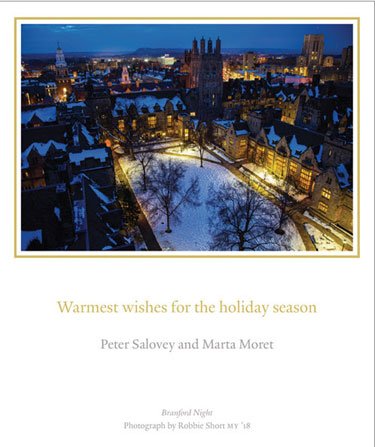
25 May 2017


Heather MacDonald debunks Peter Salovey’s sanctimonious PC nonsense.
Yale University’s president recently provided a window into the modern university’s self-conception—an understanding embraced by both liberals and conservatives but flawed in essential ways. A primary purpose of a Yale education, President Peter Salovey told Yale’s freshman class last year, is to teach students to recognize “false narratives.†Such narratives, Salovey claimed, are ubiquitous in American culture: “My sense is that we are bombarded daily by false narratives of various kinds, and that they are doing a great deal of damage.†Advocates may “exaggerate or distort or neglect crucial facts,†Salovey said, “in ways that serve primarily to fuel your anger, fear, or disgust.†(Salovey repeated this trilogy of “anger, fear, and disgust†several times; it was impossible not to hear a reference to Donald Trump, though Salovey tried to stay nonpartisan.)
According to Salovey, the Yale faculty is a model for how to respond to false narratives: they are united by a “stubborn skepticism about narratives that oversimplify issues, inflame the emotions, or misdirect the mind,†he said.
Two things can be said about Salovey’s theme: first, it is hilariously wrong about the actual state of “stubborn skepticism†at Yale. Second, and more important, Salovey mistakes the true mission of a college education.
To assess whether Yale is, in fact, a bastion of myth-busting, it is necessary to return to one of the darkest moments in Yale’s history: the university’s response to a shocking mass outbreak of student narcissism in October 2015. The wife of a college master had sent an e-mail to students, suggesting that they were capable of deciding for themselves which Halloween costume to wear and didn’t need oversight from Yale’s diversity commissars. (Halloween costumes have been the target of the PC police nationally for allegedly “appropriating†minority cultures.)
The e-mail sparked a furor among minority students across Yale and beyond, who claimed that it threatened their very being. In one of many charged gatherings that followed, students surrounded the college master, berating him for the pain that his wife had caused them. One female student was captured on video violently gesturing at the master and shrieking, “Be quiet!†as he gently tries to answer her tirade. She then screams: “Why the fuck did you accept this position [of college master]? Who the fuck hired you?â€
Of all the Black Lives Matter–inspired protests that were sweeping campuses at that moment, Yale’s shrieking-girl episode was the most grotesque. In reaction, Yale groveled. President Salovey sent around a campus-wide letter declaring that he had never been as “simultaneously moved, challenged, and encouraged by our community—and all the promise it embodies—as in the past two weeks.†He proclaimed the need to work “toward a better, more diverse, and more inclusive Yaleâ€â€”implying that Yale was not “inclusive†—and thanked students for offering him “the opportunity to listen to and learn from you.†That the shrieking girl had refused to listen to her college master—or to give him an opportunity to speak—was never mentioned; she suffered no known repercussions for her outrageous incivility. Salovey went on to pledge a reinforced “commitment to a campus where hatred and discrimination have no place,†implying that hatred and discrimination currently did have a place at Yale. Salovey announced that the entire administration, including faculty chairs and deans, would receive training on how to combat racism at Yale and reiterated a promise to dump another $50 million into Yale’s already all-consuming diversity efforts.
If ever there were a narrative worthy of being subjected to “stubborn skepticism,†in Salovey’s words, the claim that Yale was the home of “hatred and discrimination†is it. There is not a single faculty member or administrator at Yale (or any other American college) who does not want minority students to succeed. Yale has been obsessed with what the academy calls “diversity,†trying to admit and hire as many “underrepresented minorities†as it possibly can without totally eviscerating academic standards. There has never been a more tolerant social environment in human history than Yale (and every other American college)—at least if you don’t challenge the reigning political orthodoxies. Any Yale student who thinks himself victimized by the institution is in the throes of a terrible delusion, unable to understand his supreme good fortune in ending up at one of the most august and richly endowed universities in the world.
But the ubiquitous claim that American campuses are riven with racism is not, apparently, one of the “false narratives†that Salovey had in mind. Not only did the president endorse that claim, but the husband-and-wife team who had triggered the Halloween costume furor penned a sycophantic apology to minority students in their residential college: “We understand that [the original e-mail] was hurtful to you, and we are truly sorry,†wrote Professors Nicholas and Erika Christakis. “We understand that many students feel voiceless in diverse ways and we want you to know that we hear you and we will support you.†Yale’s minority students may “feel†voiceless, but that feeling is just as delusional as the feeling that Yale is not “inclusive.â€
So Salovey’s claim that Yale resolutely seeks out and unmasks “false narratives†is itself a false narrative.
RTWT
04 Feb 2017


John Caldwell Calhoun (1782-1850), Yale Class of 1804, 7th Vice President of the United States 1825-1832.
Peter Salovey’s hand-picked committee of Social Justice Warriors has deliberated and, what do you know? They decided that John C. Calhoun should be singled out among all nine slave-owner and slavery defender namesakes of three quarters of the original twelve Yale residential colleges for elimination.
Oldest College Daily:
A University task force has recommended that Calhoun College be renamed, according to Yale officials with knowledge of the group’s report.
The recommendation from the task force, which was charged with applying the University’s newly created principles on renaming to the Calhoun debate, positions the Yale Corporation to rename the college when it meets the weekend of Feb. 10 and 11.
University President Peter Salovey formed the Calhoun task force in December, after the Committee to Establish Principles on Renaming released its report. The task force consisted of two faculty members, history professor John Gaddis and English and African American Studies professor Jacqueline Goldsby GRD ’98, and one alumnus, G. Leonard Baker ’64. Both Gaddis and Goldsby signed a faculty petition last spring calling for the renaming of Calhoun, named after slavery proponent John C. Calhoun, class of 1804.
On Jan. 13, the task force submitted its recommendation — which came in the form of a report running less than 10 pages — to Salovey, who will present it to the Corporation at the February meeting.
Last month, Salovey told the News that he did not plan to release the recommendation until after that meeting. Salovey was not involved in the task force’s deliberations, although he did have some input on the final draft of the report.
“The task force did their work independently, and their analysis and recommendations are their own,†Salovey said in January. “They gave me the courtesy of letting me see a next-to-final draft of their report, and make some comments. But my comments to them were really only about sort of clarifying the way their findings were expressed.â€
If the Corporation accepts the task force’s recommendation, the University trustees would be voting to reverse their decision last April to keep Calhoun’s name. The April renaming decision incited months of student and faculty backlash, and helped unite Yale activists and New Haven community members in a growing “change the name†movement.
Last August, primarily in response to faculty criticism of the decision to keep the name of Calhoun, Salovey charged the CEPR with outlining broad guidelines for all renaming disputes at the University, starting with Calhoun. The committee released its 24-page report on Dec. 2, calling on administrators to consider historical context as they determine whether the legacies of controversial namesakes like Calhoun justify renaming campus buildings.
Vice President for Communications Eileen O’Connor declined to comment on the nature of the task force’s recommendation, but said the Corporation will decide the Calhoun issue at its meeting later this month.
“We have a process, we’re following the process, and we’ll take all the information into account when we make a decision in the best interests of the University,†O’Connor said.
Why stop there? Roger Kimball asked last August in the WSJ:
I have unhappy news for Mr. Salovey. In the great racism sweepstakes, John Calhoun was an amateur. Far more egregious was Elihu Yale, the philanthropist whose benefactions helped found the university. As an administrator in India, he was deeply involved in the slave trade. He always made sure that ships leaving his jurisdiction for Europe carried at least 10 slaves. I propose that the committee on renaming table the issue of Calhoun College and concentrate on the far more flagrant name “Yale.â€
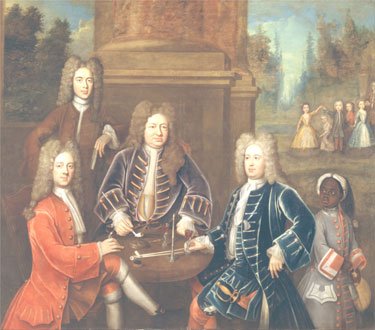
Elihu Yale had a little black page.
15 Nov 2016

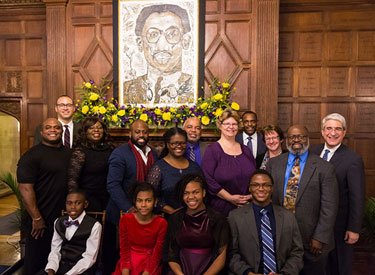
Up at Yale yesterday, they renamed the dining hall of Calhoun College for Roosevelt Thompson, a Yale student of color of the Class of 1984 who got killed in a car crash his senior year.
John C. Calhoun, a non-colored Yale graduate of the Class of 1804, was originally the namesake of the Yale residential college and dining hall which opened in 1933. Calhoun was singled out for that honor on the basis of having been Vice President of the United States, and thus being, as the college’s Wikipedia entry notes, “the only Yale graduate to be elected to a federal executive office in the school’s first two centuries, until the election of U.S. President William Howard Taft in 1909.”
John C. Calhoun served additionally as Secretary of State and Secretary of War. He was elected four times to the House of Representatives, and twice to the U.S. Senate. In the Senate, the strength of his ideas and his rhetorical powers won Calhoun the very exceptional place in History of being traditionally regarded as one of the three all-time giants, along with Daniel Webster and Henry Clay, as the “Great Triumvirate” or the “Immortal Trio,” of that legislative chamber.
John C. Calhoun, beyond his political career, was distinguished as the greatest and most influential writer on Political Philosophy ever produced by Yale. Calhoun was on the losing side of history, as a supporter of Secession and States’ Rights, and as an agrarian defender of Slavery as a benevolent institution and a positive good. His opinions on those issues were defeated on the battlefield, and History has turned the page, but his spirited defense of the rights of minorities to be protected as “concurrent majorities” by limitations on the numerical power of the majority still deserves contemporary consideration and respect.
Roosevelt Thompson is demonstrably considered worthier of (so far, only) Calhoun’s Dining Hall simply on the bases of being born with melanin in his skin, being a popular and successful student, and having died young. Whether the appropriation of John C. Calhoun’s honors at Yale stops with the dining hall remains to be seen. Yale President Peter Salovey mendaciously announced last April that Calhoun College would be keeping its name, then, in late summer, announced the appointment of a “Committee to Establish Principles of Renaming.” Salovey’s Stalinist Renaming Committee is stocked fully with Social Justice Warriors and opponents of hierarchy, Southern Agrarianism, States’ Rights, and John C. Calhoun, so the fix is in.
Yale News
26 Oct 2016

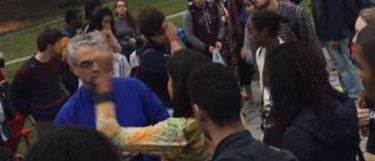
Former Silliman College Master Nicholas Christakis told by Shrieking Student to resign. He promptly went on sabbatical and then did resign.
Richard Epstein contemplates the shame of Yale’s sexual misconduct star chamber tribunals along with the hypocrisy of President Peter Salovey’s claim that Free Speech flourishes at Yale.
Salovey takes great pride in noting “the Yale administration did not criticize, discipline, or dismiss a single member of its faculty, staff, or student body for expressing an opinion.†That sentence may be technically true, but it does not explain why Salovey did not mention the unfortunate fate of Nicholas and Erika Christakis, both of whom resigned from Yale under massive pressure after student protestors demanded that Nicholas be removed from his position as master of Silliman College. Why? Because Erika had written an email that took issue with a letter from Yale’s Intercultural Affairs Committee that warned students against various insensitive forms of behaviors, like wearing offensive Halloween costumes. The letter noted, like Salovey’s op-ed, that Yale values “free expression as well as inclusivity.†But the massive level of abuse directed at Nicholas and Erika Christakis reveals how strongly Yale weighs one imperative over the other.
Read the whole thing.
Yale surrendered to the Obama Justice Department’s Russlyn Ali, immediately upon receipt of her infamous “Dear Colleague letter,” which threatened withholding of federal funds to universities which failed to establish
Sexual Harassment Inquisitorial procedures forthwith.
President Salovey announced last Fall that he was firmly behind the Christakises, when outraged student demonstrations erupted after Mrs. Christakis wrote an email questioning the appropriateness of an Intercultural Student Affairs edict warning against students wearing Halloween costumes which could be interpreted as belittling or culturally appropriative: no sombreros, no blackface, no turbans. Both Christakises, nonetheless, were out of the Master’s House in Silliman in short order and out of New Haven. A decent interval, up until the next Mid-Summer, was allowed to go by to save Yale’s face, before Nicholas Christakis’s permanent resignation was announced. Way to go, Free Speech at Yale!
18 Oct 2016

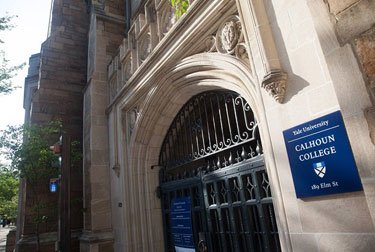
When Yale established the residential college system in emulation of the independent colleges of Oxford and Cambridge, one of the then ten colleges established was named for Class of 1804 alumnus and one-time Vice President, Secretary of State, Secretary of War, illustrious Senator and political theorist John C. Calhoun.
Wikipedia puts it blandly:
Because of his political, military, and intellectual achievements, Calhoun was venerated as an illustrious Yale alumnus beginning in the mid-nineteenth century. He was the only Yale graduate to be elected to a federal executive office in the school’s first two centuries, until the election of U.S. President William Howard Taft in 1909.
But the reality is, Southerner and intellectual father of the Lost Cause though he was, John C. Calhoun, in the era preceding the radical left’s Long March through the Culture and the Universities, was universally regarded as one of the three all-time giants of the Senate, and the single most important American statesman and political thinker to have ever graduated from Yale.
Last April 27th, Yale President Salovey announced that the University was declining to comply with demands from snowflakes of color that Calhoun College be renamed. This rebuff was, however, accompanied by other payoffs: the traditional title of “Master” for the distinguished senior faculty member who presided over a Yale residential college would be henceforward changed to “Head,” lest some dimbulb darkie confusing an ancient academic title with a reference to Antebellum Slavery be offended, and one of the two new residential colleges under construction would be named for some African-American leftist dyke whom no non-communist had ever previously heard of.
The fate of John C. Calhoun’s college seemed to be settled, but, no! it turned out that Salovey was a welsher. Just a few months later, when August rolled around, Salovey announced the formation of an Orwellian “Committee to Establish Principles of Renaming.”
The membership of that committee included a variety of individual SJWs, all obviously keenly committed to contemporary political perspectives intensely hostile to the culture and institutions of the Antebellum Southern United States and passionately opposed to the sectional and anti-egalitarian views of the late Senator Calhoun. There will be found on that committee not one single conservative, one defender of the Southern perspective, one admirer of Calhoun, or even one Old Blue traditionalist. The renaming committee is still currently holding meetings, but to say that its ultimate report is a foregone conclusion would be an massive understatement.
1997 alumnus Alexander Zubatov is the kind of graduate who ought to be in charge, but is not. Zubatov writes indignantly:
[T]he very name, “Committee to Establish Principles on Renaming,†…sounds like something Josef Stalin would have come up with while attempting to whitewash Soviet history of references to tsars, saints and that sort of thing. The act of erecting a one-issue litmus test for whitewashing American universities of references to slavery is equally myopic and dystopian. Undoubtedly, those immersed in the committee’s mission would believe the difference is that they are doing the good Lord’s work in furtherance of a just cause, and yet, wouldn’t they have to concede that Soviets visionaries and bureaucrats surely shared that view?
This nation has become obsessed with race, racism, slavery, discrimination and the cancer of regressive, zero-sum, winner-take-all identity politics, with the result that ideologues on the left and right are ensuring Americans are divided, polarized and pitted against each other based on their most superficial identifications. Yale, like many institutions of higher education in America, appears to have lost sight of the fact that part of the mission of an educational institution should be to avoid trend-hopping and to remain above the fray, to stand back from the dust cloud of our present-day turmoil and avail itself of the more nuanced and distanced vantage points conferred by academic disciplines such as history and philosophy, which further deep reflection rather than shallow proclamations and knee-jerk actions. By contrast, a university that is constantly bobbing and weaving in fear as a response to every whim of impulsive students who have not yet acquired the ability to stand back and think is a university that has lost sight of its educational mission. It is a university being run by spineless technocrats and cynical profiteers afraid of losing a few dollars for a few days on account of being branded “racist†in some hysterical student screed, YouTube video, or viral Tweet.
I have no doubt whatsoever that those who act most rashly today will be judged most harshly by history tomorrow. What we need today is not the renaming of buildings but a re-framing of the entire debate so that the question is not under what conditions we should or should not rename buildings, but rather, why it is that we have come to a point in our culture where so many people have become so over-determined by what Max Weber referred to as their “status groups†(races, gender affiliations, sexual proclivities, etc.) that they are blinded to the common good of our society as a whole.
Read the whole thing and shed a tear for Yale and another for the late Senator from South Carolina.
Your are browsing
the Archives of Never Yet Melted in the 'Peter Salovey' Category.
/div>

Feeds
|
















